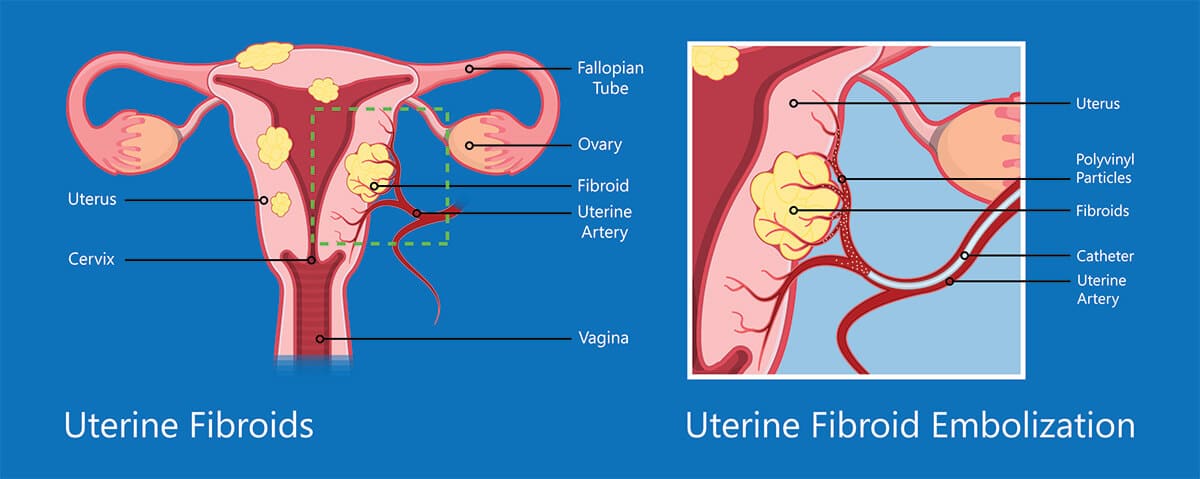What is Uterine Fibroid Embolization (UFE)?
Fibroids are very common, and UFE can sometimes be the right procedure to address them. For many women who experience common symptoms of fibroids like pelvic pain, heavy bleeding or even infertility, UFE is a less invasive option than a hysterectomy. When it is an option, it can make a real difference.
Even though the procedure to reduce or eliminate fibroids has been around for a while, we’ve found that not everyone knows what a UFE is and when they might be a candidate to consider the procedure.
In order to help our patients to better understand this treatment option, we have prepared answers to some frequently asked questions about Uterine Fibroid Embolization.

What are some of the symptoms of fibroids?
Symptoms may include heavy menstrual periods, anemia, bloating, pelvic pain, painful intercourse, constipation, and frequent urination. Because of the heavy bleeding, patients may become anemic and feel tired or even become short of breath.
How do fibroids affect daily life?
Some women do not experience symptoms that affect daily life. But many women with fibroids are not able to live their life the way they want. Intimacy can be affected, social life can be curtailed, and pain and heavy bleeding can limit participation in physical activities. Some women are not able to become pregnant due to fibroids. Everyday life, and even work, can be affected by fibroids.
What happens during a Uterine Fibroid Embolization?
We describe UFE as a minimally invasive, non-surgical treatment that is an alternative to a myomectomy or hysterectomy (two surgical procedures that involve removing part of all of the uterus). A thin tube (called a catheter) is inserted through an artery in the upper thigh or wrist and guided to the artery providing blood flow to the fibroid. Specially engineered particles are introduced through the tube, cutting off the blood supply to the fibroid and causing it to shrink over time.
Is the patient sedated during a UFE?
The patient is sedated and typically feels minimal pain. General anesthesia (in which the patient is completely unconscious) is not required.
Who performs a Uterine Fibroid Embolization?
A UFE is performed by an interventional radiologist (IR). An interventional radiologist is a doctor who uses x-rays and other imaging techniques to see inside the body and treat conditions without surgery. At Preferred Fibroid and Vascular Center, each of our IRs is board-certified by the American Board of Radiology.
How is pain managed?
Typically, the treatment will result in some post-procedure pain and discomfort. We have a well-defined plan for management of pain. We use a variety of prescription and non-prescription medications to ensure that our patients have limited pain. We review this plan with our patients when the procedure is scheduled and again on the day of the procedure. No patient leaves our facility until her pain is well-controlled, and we are available after hours should any questions or concerns arise. For most patients, only over-the-counter medication is needed after 3 days to manage any pain or discomfort.

How long does it take to recover from the UFE?
Treatment will require a short post-procedure recovery of a few hours at the center to ensure any pain is managed before you go home.
A recovery process of up to one week is usually recommended before returning to full work or personal activity. We see each of our patients 2 weeks after the procedure, We continue to monitor and evaluate your recovery process for at least 2 months although you may continue to experience improvement for up to 6 months after your procedure. We continue to support and inform our patients throughout preparation, treatment and recovery.
What are the most common outcomes of this procedure?
Most patients report an improvement in symptoms from as early as a couple of weeks after the procedure and continuing for months after recovery. Some patients require further interventions. With an improvement in symptoms, many of our patients have reported being able to return to the normal experiences of life that they were missing.
Am I a candidate for a UFE?
Women who cannot or do not want to undergo major surgery may be candidates for UFE. Although it is not always the case, women who may want to become pregnant in the future will want to choose UFE over a hysterectomy to maintain this possibility. Some women choose UFE when possible because they need a faster return to work or other activities and the faster recovery time allows them to be back at work sooner.
We have been providing the Uterine Fibroid Embolization procedure (UFE) for women in Georgia for years. Reach out to us today for a consultation to see if the UFE is right for you.
